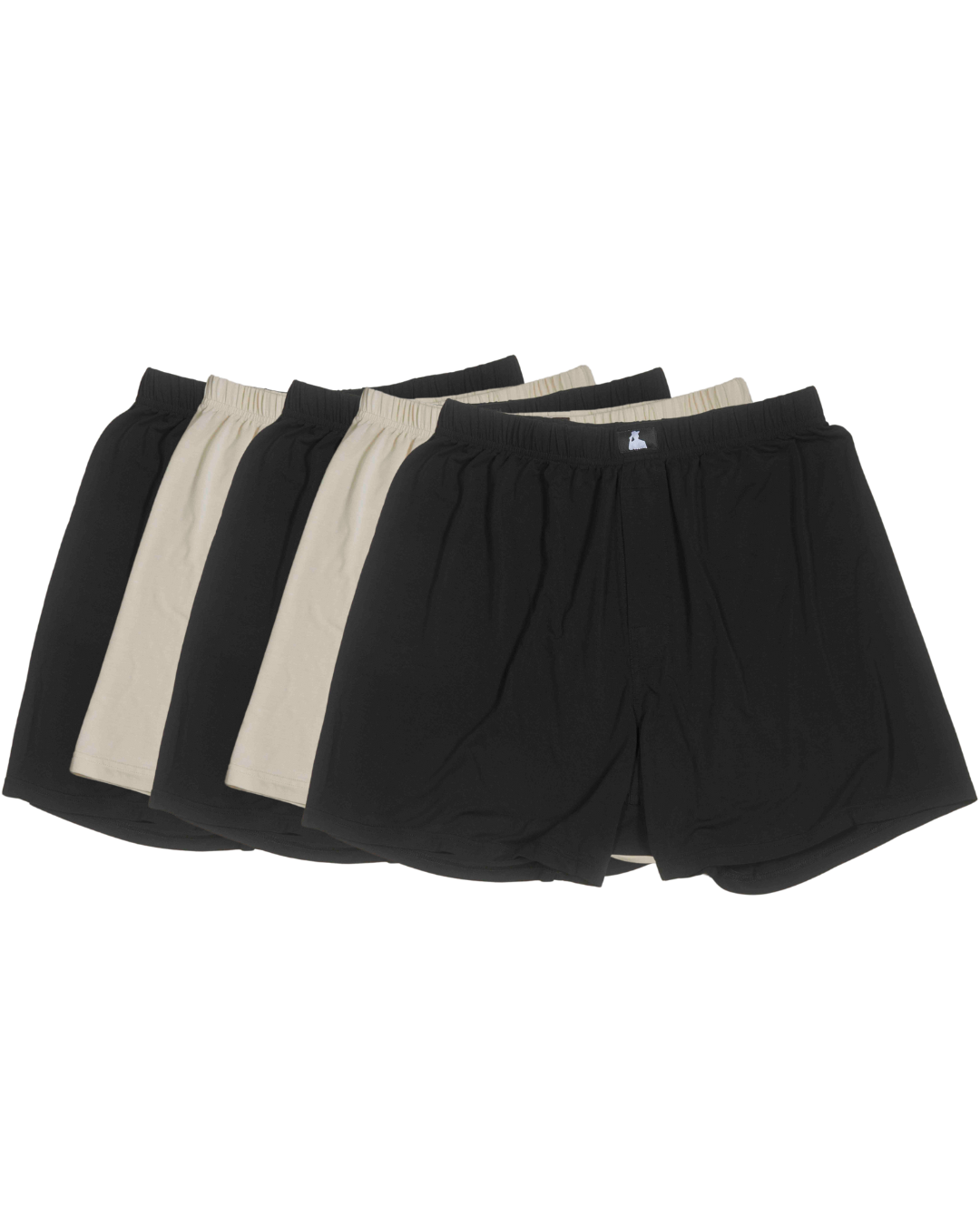Why Men’s Bamboo Underpants Are the Healthiest Choice for Fertility & Comfort
Written By The Mr. Fertyl Research & Education Team
The conversation around men’s reproductive health and comfort in clothing is becoming more open – and for good reason. Men are paying more attention to how underwear affects not only comfort but also fertility. Bamboo fiber (especially eco-friendly Bamboo Lyocell) has surged in popularity as an underwear material because it feels luxurious and supports health. In fact, market reports highlight that bamboo is viewed as a renewable, eco-friendly resource often made with fewer chemicals [8]. Brands are responding: you’ll find more bamboo briefs and boxers popping up in stores. This trend isn’t just about going green – it’s about choosing fabrics that are super-soft, highly breathable, and gentle on the body.
Bamboo Fabric: Natural Softness and Breathability
Bamboo underwear is prized for its silky softness. Many comparisons say Bamboo Lyocell feels smoother than silk or cashmere. Its fibers are round and gentle, so the fabric slides comfortably over skin without irritation. Beyond touch, bamboo has a unique fiber structure with micro-holes and natural hollows. These tiny pores allow air to circulate freely through the fabric, which naturally regulates temperature. In practice, that means bamboo underpants won’t trap heat or sweat. Instead, they quickly wick moisture away from the skin, keeping you dry even when things heat up. Bamboo’s breathability helps “regulate body temperature by allowing heat and moisture to escape”.
Bamboo is also inherently antimicrobial. It contains a natural substance called bamboo kun (from the plant’s lignin) that resists bacteria. In finished fabric, this means bamboo underpants stay fresher longer and develop less odor. As a result, Bamboo Lyocell underwear not only feels more comfortable but also stays fresher between washes (a handy perk for daily wear). In short, bamboo fabric is soft, breathable, moisture-wicking, and even odor-resistant, making it ideal for sensitive areas.

Upgrade Your Everyday
Shop Healthier UnderwearTemperature, Tightness, and Sperm Health
One key to male fertility is testicular temperature. Sperm production requires the testes to be a few degrees cooler than core body temperature [1][2]. Tight or insulating underwear can raise scrotal heat, which can harm sperm. Research shows that overheating the testes impairs sperm production: if “testes are too hot… they are not able to produce sufficient sperm,” resulting in a lower sperm count [2]. In fact, one long-term animal study found dogs wearing polyester pants had significantly lower sperm counts and more abnormal sperm than those in cotton, purely from fabric effects [3].
Human studies echo the message. The largest study of its kind found men who wear loose boxers (a cool, airy style) have healthier semen parameters than men in tight briefs. Boxers-wearers had about 25% higher sperm concentration and 33% more motile (swimming) sperm than men in tighter underwear [5]. They also had lower levels of FSH hormone, suggesting their bodies needed less “compensation” for any heat stress [5]. In other words, cooler underwear correlates with better sperm quality.
Putting it practically: bamboo fabric, with its exceptional airflow and sweat-wicking, helps keep the scrotal area cooler. You breathe easier (and so do your testicles). Loose-fitting bamboo boxers or briefs let heat escape rather than building up. And because sperm generation cycles take about 10–11 weeks, choosing a cooler fabric now pays off later [2]. (As one fertility doctor stated: “You can’t just wear boxers the night before and expect it to work” – it takes consistent coolness over weeks for sperm to improve[2].)
The takeaway: Even though authorities like the Mayo Clinic note that no definitive study has proven that underwear choice alone kills fertility [1], common sense and mounting evidence agree on one point: avoid excess heat. That means favoring breathable fabrics and looser fits. Bamboo Lyocell helps on both fronts.
Chemicals, Absorption, and Fabric Safety
Besides temperature, chemical exposure is another fertility concern. The skin of the scrotum is extremely thin and permeable – it absorbs substances far more readily than almost any other skin site [6]. In fact, research shows the scrotal skin can allow almost total penetration of a liquid chemical[6]. This means any nasty dyes, flame-retardants or solvents in your underwear are more likely to be absorbed in that area. Many conventional textiles are treated with chemicals (like flame retardants, PFAS stain protectors, formaldehyde finishes, etc.), which have been linked to endocrine disruption and fertility issues [4].
Bamboo Lyocell offers a cleaner alternative. For starters, bamboo plants grow fast with minimal water, fertilizers, or pesticides. And critically, bamboo Lyocell is produced in a closed-loop process. It uses a non-toxic solvent (N-Methylmorpholine N-oxide) that is reused over and over, so nearly all of it is recovered [7]. In practice, that means very little hazardous chemical is dumped into the environment or left in the fabric. By contrast, conventional rayon or viscose can involve harsher chemicals. The result is that Bamboo Lyocell underwear tends to be much lower in residual toxins.
Pair that with bamboo’s natural anti-microbial fiber (which avoids the need for chemical odor-control finishes), and you get an undergarment that’s gentle on even the most absorbent skin [6]. Every time you wear bamboo underpants, your skin is exposed to fewer foreign chemicals. Given the scrotum’s high absorption, this can matter – it’s one more way bamboo underpants can be safer for men thinking about fertility.

For Strong Foundations, Start Here.
Shop Fertility FirstThe Mr. Fertyl Advantage
For health and fertility-focused men, the Mr. Fertyl brand has specially designed Bamboo Lyocell underpants to hit all these points. Mr. Fertyl uses Bamboo Lyocell that’s soft as silk , highly breathable, and moisture-wicking. The underwear is cut to avoid constriction (allowing free airflow) and has a comfortable pouch design to keep everything naturally separated. Importantly, it’s made through the clean closed-loop process mentioned above [7], so each pair is virtually free of toxic residues. That aligns with what market analysts expect: today’s men want natural, fewer-chemical fabrics [8], and Mr. Fertyl delivers exactly that.
Key highlights of Mr. Fertyl Bamboo underpants include:
- Silky Softness: The premium bamboo Lyocell fabric feels smooth and gentle against the skin
- Breathable Comfort: The fabric’s micro-porous structure wicks sweat and lets air flow, helping to keep your temperature down even on warm days.
- Chemical-Free: Made in an eco-friendly closed-loop process [7], the fabric contains virtually no harsh processing chemicals. It’s hypoallergenic and kind to sensitive skin.
- Sustainable Choice: Bamboo is a renewable, fast-growing plant, and the manufacturing minimizes waste [7][8]. By choosing Mr. Fertyl’s bamboo undies, you also support a smaller carbon footprint and fewer pesticides.
In short, Mr. Fertyl underpants are built for men who care about fertility and the planet. The combination of cooler fabric, natural softness, and clean processing means you get first-rate comfort with peace of mind about reproductive health.
Men’s underwear doesn’t have to be a taboo topic – it’s part of holistic health. By normalizing the discussion and picking better materials, we can all take small steps toward better reproductive wellness. After all, feeling good in your underwear can translate to feeling good about fertility.
- Mayo Clinic (Speaking of Health Blog), “Boxers or briefs? 4 common fertility myths debunked,” 2019 Source.
- WebMD News, “Boxers vs. Briefs: Increasing Sperm Count,” (Dr. Amos Grunebaum) Source.
- Shafik A. Urol Res 1993, “Effect of different types of textile fabric on spermatogenesis” (dog study) Source.
- EarthDay.org, “Toxic Textiles: The Chemicals in Our Clothing,” 2022 Source.
- Mínguez-Alarcón et al., Hum Reprod 2018, “Underwear type and sperm quality,” (Harvard study) Source.
- Unifor (labor group) Chemical Safety Fact Sheet (Canadian workers’ guide) Source.
- GoodOnYou, “Material Guide: What Is TENCEL (Lyocell)?” (closed-loop processing) Source.
- GMI Insights (market report excerpt), “Men’s Underwear Market” (citing eco-friendly bamboo fiber trend) Source.

